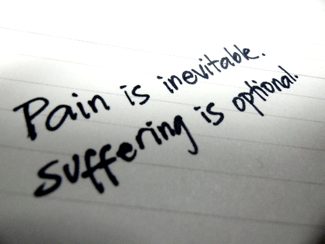Ok…the first question that is really going tickle the deepest neurons we possess. This one, really doesn’t have just one answer, let alone a “right” answer. I will admit this is truly all about how one perceives the concepts within the question, as well as the point of such a question.
It would be so easy to just say the following, and then peace out:
“Of course! We have all lived, thus all experienced suffering and pain; ergo, it must be a part of life!”
Shout out to my boy Descartes for the inspiration and logical fallacy! RIP, Bro!
I digress…
This is the issue with philosophical questions. They possess answers that are both right and wrong…it is all dependent upon the context in which you apply the question.
Ask this question to the guy who just won the lottery and is spending like crazy. At that particular point in time, in that particular context, the answer would be and emphatic “No!” Fast forward down the road when that guy maybe invests poorly and goes broke, loses everything, and is ostracized by those who warned him, then the answer quickly shifts to “Heck, yes!”
See what I mean? The context derives the right or wrongness of the answer.
If we were to examine Biblical perspective, the answer would also be Yes and No. Originally, pain and suffering, and all other negative emotions, were not supposed to be a part of life! However, without going into a Genesis history lesson, we humans kinda screwed the pooch on that one. Thus, enter sin, and accordingly, enter the negative emotional world.
But let’s look at the interesting flip-side of this question.
Newton’s third law of motion tells us that for every action, there is an equal and/or opposite reaction. While this applies to force, mass, and objects, we can philosophically apply it to life. In fact, we have been doing it for centuries. The idea that there is good to balance the evil. Christianity calls this God vs. Satan (Heaven vs. Hell), Hinduism says it’s Karma, and plenty of other terminologies exist. The bottom line is the same…for a negative, there is a positive.
Now, apply this thinking, and depth of understanding, to pain and suffering and all other emotions!
But, let’s add another thought to the mix…right out of good ol’ Psychology.
For years, Psychologists, Social Workers, Sociologists, and Doctors have been trying to understand the brain and mind and all they do. One of the biggest pickles, is the ideas of dreams and the imagination. What are they? What’s their purposes? Are they truly unique? Again, you can dig deeper into the research that leads to these conclusions, but here is the main idea:
Knowing how the neural links are designed in our brain, paired with how memory functions, learning is established, and the application of said things, we know that the mind and brain cannot create completely new and never known things.
Let me clarify. That does not mean imagination and creativity do not exist as we have seen them. What it means is that the brain and mind create things BASED upon already encoded information. Whether that information was encoded as a quick glance of someone’s face that we will never physically see again, or as a series of repetitions of chemical chains in a lecture for an exam and a future pharmaceutical career. Ideas are creative only in that they are an amalgamation of previously established information. It still is a brilliant and amazing process, but it also shows our dependence upon others and things outside of ourselves, for the advancement of our kind and civilizations.
NOW we apply it all.
To begin to answer this question, I posit other questions based upon what we know now, given the aforementioned “lessons”:
If we did not know the negative feelings, could we actually acknowledge the positive feelings as their own entities?
- That is, without pain, could we know healing? Could we know happiness without sorrow? What about peace without chaos?
Conversely, could we know these negative feelings exist without their positive counterparts?
Throwing back to the Biblical sense, I believe that we could acknowledge the positives without the negatives at one time, because at that time we had no sin and a being (God) existed outside of and greater than our comprehension, who gave us the perspective. But for those who don’t subscribe to the theological perspective, I leave us all with these thoughts….
I think we all can agree that at some point IN life, pain and suffering is inevitable. Anecdotal and circumstantial evidences show this to be true. But the bigger question within the question should be as such:
Should pain and suffering be a CONSTANT part of life?
Can we decide to LEARN where it comes from and its positive counterparts, and CHOOSE to be better, happier, joyous, and peaceful?
There is the answer.
Pain and suffering are only there if you choose to acknowledge them as part of your life.
So, will you succumb to their inevitability?
Or, will you rise above them and transcend the joys that come when you defeat them in the pits?
The choice is yours…it is all of ours….but a choice that you are not alone in.
Choose wisely.
As always, stay Blessed!





